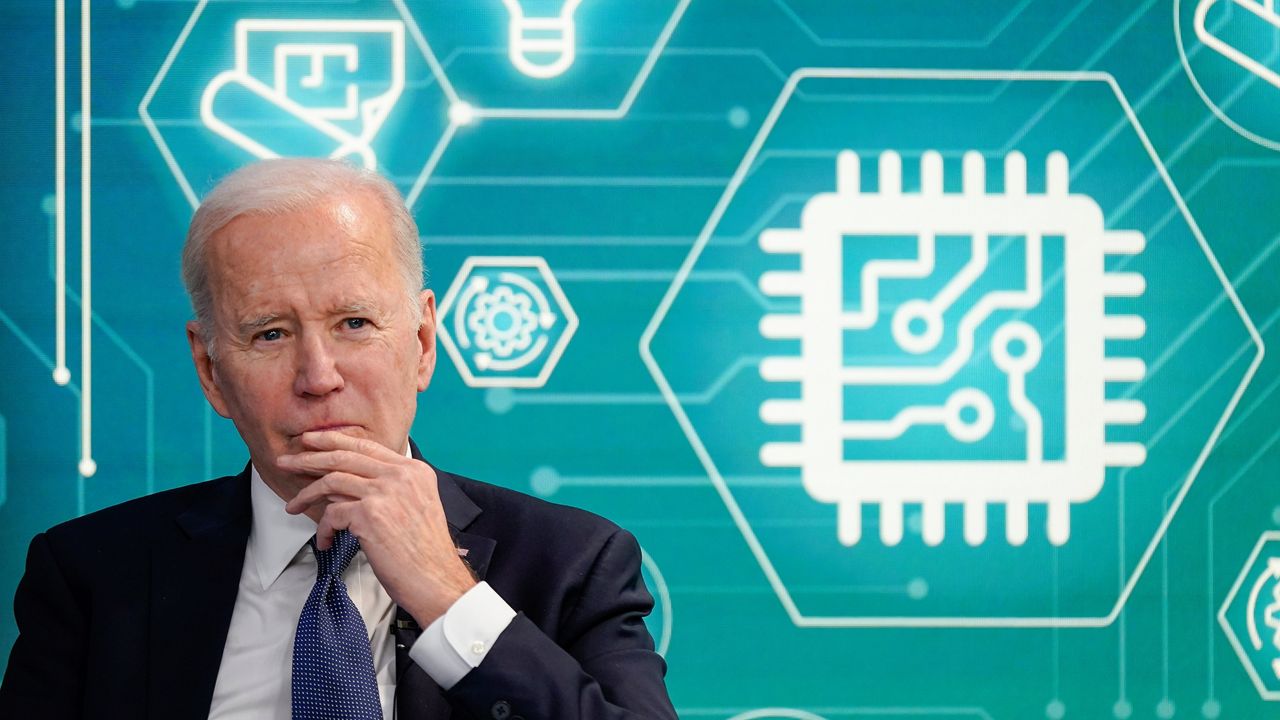On Tuesday afternoon, President Joe Biden, who is still recovering from COVID-19, joined an event in Michigan virtually to celebrate the passing of the CHIPS and Science Act of 2022 and to mark the signing of Gov. Gretchen Whitmer’s executive directive to implement the measure.
The bill, which passed the House and Senate last week, will provide funds to increase domestic semiconductor manufacturing and fund federally backed research and development.
It contains $52.7 billion in subsidies to boost domestic semiconductor production, along with a 25% tax incentive for investments in domestic chips worth roughly $24 billion.
It also contains $200 billion for federally-backed scientific research, $1.5 billion for the development of “open-architecture, software-based wireless technologies,” and $11 billion for the Commerce Department to establish “regional technology hubs” nationwide.
The bill’s proponents on both sides of the aisle say that it’s crucial for both national and economic security, and essential to ease supply chain disruptions, bolster national security and increase competitiveness with China.
Michigan has been one of the states deeply impacted by the semiconductor supply shortage, with Detroit automakers particularly struggling due to the lack of chips, forcing them to halt production multiple times due to the shortage over the last two years, according to Reuters.
Gov. Gretchen Whitmer, a Democrat who is up for re-election in November, spoke in person at Hemlock Semiconductor Corporation’s factory in Hemlock, Michigan, on Tuesday afternoon.
“For months, I've been advocating with a number of my colleagues on both sides of the aisle across the country to make sure that we would make sure that this day happened,” said Whitmer to the audience. “I knew the impact that's having on Michigan and I am incredibly proud to see it pass.”
In her speech, Whitmer said that this legislation is a win for workers, manufacturers, and consumers and that it will help lower costs on “everything from cars to dishwashers to medical devices and graphics cards.”
“With this CHIPs and Science Act, we can surge American manufacturing capacity and make up for lost time,” added Whitmer. “I know that families are feeling the pain right now. Inflation supply chain challenges are continuing to impact prices increasing on everything from a pound of beef to a new PC.”
But, “once President Biden signs the CHIPS Act, the benefits will be felt far and wide and quickly,” she said.
Sen. Gary Peters, D-Mich., joined the event virtually and praised President Biden for his “incredible leadership” and for “understanding that right now we are facing some significant changes to our supply chain.”
“There's no question this will create more jobs for people in the United States,” said Peters. “It’s going to hold down price increases on manufacturing goods. And bottom line, this is about homeland security, national security, and economic security.”
Whitmer introduced President Biden, who was joining the event virtually from the White House after testing positive again for COVID-19.
“As we meet to celebrate this bill, I'm reminded of what we did more than a decade ago when we rescued the American auto industry in the wake of the Great Recession,” said Biden. “There were those who said we should just let it go bankrupt… But we in this room refused to let that happen, and it wasn't just because it is an iconic industry, it was because the auto industry is the heart and soul of the nation.”
"It’s about America’s future,” added Biden. “And one of the reasons why I'm so excited about the CHIPS and Science bill is that it sees that future for decades to come.”
“As we saw during the pandemic when the factories overseas that make these chips shut down, the global economy comes to a screeching halt, driving up costs for families in a big way,” the president said. “A third of the core inflation last year was due to the high price of automobiles, which was driven by the shortage of semiconductors.”
In his closing remarks, President Biden acknowledged that there was more work to do but said that the “progress we’re making is proof that we are the United States of America.”
“There's not a thing we can’t do,” he said. “We invented these chips, we modernized these chips, we made them work, and there's a lot more we're gonna get done. So please, please, please, have faith in our country, have faith in what we can do.”
“There's nothing beyond our capacity,” said Biden. “Nothing.”
After the remarks ended, Whitmer signed the executive directive, which she stated would “empower Michigan to utilize the CHIPS and Science act as effectively as possible so we can compete for every project, every program, and every resource.”
The directive will position the state to compete for CHIPS manufacturing funding.
President Biden is expected to sign the bill into law sometime in the coming days.



